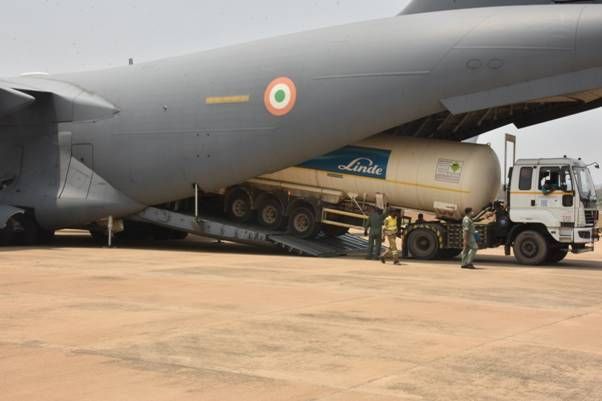Boeing ensure operational readiness of Indian defence platforms
By Rohit Srivastava

One of the most assuring images of the Covid-19 pandemic was the Indian Air Force (IAF) ferrying medical oxygen supplies from abroad to India in transport aircraft. More often than not the heavy lifter Boeing C-17 Globemaster was executing the task.
Keeping the fleet operational during a humanitarian crisis with high sortie demand for a long period where an aircraft may have to fly without prior notice. Keeping the fleet ready for such contingencies was made possible by the maintenance team of the IAF and Boeing, the manufacturer of C-17.
Boeing is supporting the IAF C-17 fleet under the Globemaster Integrated Support Program (GISP) and has been maintaining the fleet through techno-logistics support for the aircrew that operates the platform.
The C-17 fleet has maintained high serviceability rates since its induction. Boeing is responsible for maintenance, field support services, modifications and upgrades, technical manual support and logistics engineering services. India purchased 10 C-17s in 2011 for $4.7 billion through a Government-to-Government deal with the US. In 2017, India ordered another C-17.
Speaking on the company’s support to Indian forces in maintaining Boeing aircraft operational, Surendra Ahuja, Managing Director, Boeing Defence India, said, “Our proven portfolio of products and services offer unmatched operational capabilities to India’s defence forces across the entire mission spectrum. Today, we support India in its operations of 11 C-17s, 22 AH-64 Apaches (with six more on order), 15 CH-47 Chinooks, and 10 P-8Is (with two more on order).”
The C-17 fleet has been a vital part of the Indian Air Force’s (IAF) strategic and combat airlift capability. They have been involved in a variety of military missions including strategic airlift, troop deployment, peacekeeping support, humanitarian assistance and disaster relief both domestically and internationally since their induction into the Sky Lords squadron in 2013.
During the Covid-19 waves of 20/21, IAF was tasked to ferry heavy loads of supplies to ensure there is no shortage of essential and medical items in any part of India. During the Covid-19 second wave of ’21, IAF pressed its heavy lifter C-17 to transport empty oxygen tankers to the place of filling stations across the country to speed up the distribution of much needed medical oxygen.
The heavy lifters were also tasked to transport load comprising bio-safety cabinets and autoclave machines for setting up of an additional COVID test facility at Leh. The IAF transport aircraft were on standby to be deployed at short notice.
Fleet Support
“We are seeing growth in our services business and with it, growth in the value Boeing creates through product lifecycle support and training. We are already working with the Indian Air Force to provide exceptional operational capability and mission-readiness for the C-17s, the Head-of-State aircraft and the Chinooks and Apaches,” Ahuja said.
Besides providing performance-based logistics to Indian military operators, Boeing’s support is a spectrum of innovative products and services which includes integrated fleet support to maintenance, modifications and repairs which directly support and enhance capabilities while reducing the total cost of ownership for its customers.
To provide such a bouquet of services, the company has made significant investments in services infrastructure, building local capabilities, workforce training and partnerships in India. This is to ensure the Indian armed forces complete their missions, operating assets at peak condition, affordably.
BIRDS
Earlier this year, Boeing India Repair Development and Sustainment (BIRDS) Hub was launched. It is an initiative to bring together ecosystem partners to shape India as a strategic destination for aerospace engineering, maintenance, repair and sustainment services. This is not to be confused with a company operated Maintenance, Repair and Overhaul facility.
This is the first of its kind initiative that seeks to provide customers with best-in-class solutions, efficient turnaround times, and optimal economical value, all available in-country.
“We believe it makes more sense to partner with local MROs that are already established and have great capabilities. We bring specific training to their employees as required per the scope of work. One such example is Air Works in Hosur who we work with for the heavy checks on the P-8I fleet,” said Surendra Ahuja.
“Likewise, we are constantly on the lookout to do more here. While we are already doing P-8I wheels and brakes in-country, we are now examining local MROs for their ability to do P-8I landing gear overhaul, and, even engines,” he added.
Boeing is currently working with 275 plus suppliers in the country and that number continue to grow. Boeing’s industrial partners in India are raising the bar to deliver world-class quality, cost-efficiency, and productivity, as they become an important part of the company’s supply chain for some of the most advanced platforms in the world.
Indian Partners
Boeing is integrating Indian partners into its global supply chain of critical parts of defence aircraft. At present, the company is sourcing 26 per cent of Indian supplies from the Micro, Small and Medium Enterprises (MSMEs) sector and is working to develop them to support the Aatmanirbhar Bharat initiative of the Government of India.
Some of the leading Partners of Boeing in India.
Dynamatic Technologies manufactures the ramp and complex aft pylon for Chinook heavy-lift helicopters. Dynamatic Technologies was recently awarded a contract for manufacturing assemblies for Boeing’s newest tactical fighter, F-15EX Eagle II. This is a first where aerostructures for the latest and most advanced F-15EX Eagle II will be made in India.
Rossell Techsys manufactures wire harnesses and electrical panels for the AH-64 Apache, and the harness for several defence platforms including CH-47 Chinook, F-15 and F/A-18 Super Hornet.
Bharat Electronics Limited (BEL) manufactures IFF (Identify Friend/Foe) and speech secrecy system for the P-8.
Tata Boeing Aerospace Limited (TBAL), Boeing’s first equity joint venture in India, with Tata Advanced Systems Limited (TASL) has been producing aero-structures for Boeing’s AH-64 Apache helicopter, including fuselages, secondary structures, and vertical spar boxes for customers worldwide.
Talking about the local sourcing Ahuja said, “We are also leveraging the Indian industrial base for local capabilities including supply of indigenous equipment on the P-8I and repair of critical components. With Airworks Pvt Ltd, we have been successfully addressing heavy maintenance checks for the P-8I in the country.”
“Further capability development planning is in progress to support the growing P-8I fleet, improving the local aviation ecosystem while ensuring quicker turnaround for the Indian Navy,” he added.
For a long-term industrial partnership with the Indian aviation ecosystem, Boeing is investing in local capacity-building as well as collaborations with Indian organizations across manufacturing, infrastructure, engineering services, research and technology, training, and skills development.
These collaborative programs are targeted at creating a skilled and trained workforce in India which is a prerequisite for a sustainable and robust ecosystem that is a must for making India a key hub for aerospace and defence manufacturing for the world.



